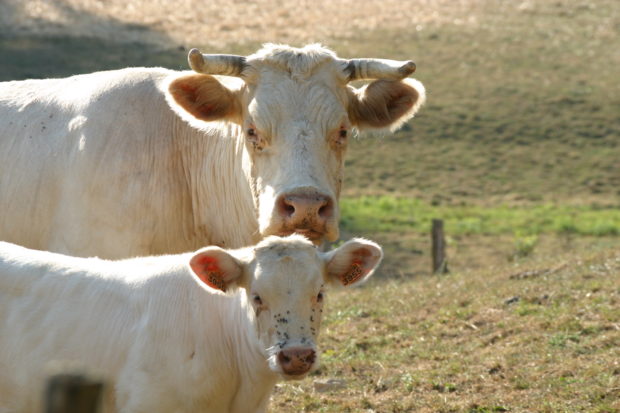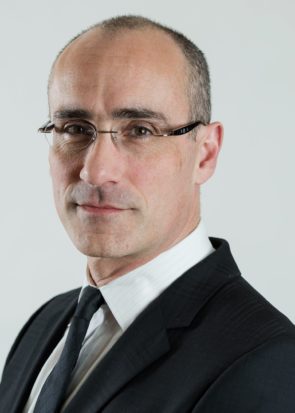On this blog [HSUS], I write about urgent battles for animals, answer the critics and adversaries of animal protection, and comment on trends and major news in the world of animal protection. But I also see this as a platform for big thinkers who associate themselves with animal protection and the values that undergird it. On today’s blog, I interview Arthur Brooks, one of the foremost conservative intellectuals in America. A vegetarian and a Catholic, he is the very respected president of the American Enterprise Institute (a leading think tank on the right), a bestselling author, and a New York Times columnist. Driven in part by his faith, Brooks argues that, when aligned with our values, the free market can be a force for good. This is a similar argument to the one I make in The Humane Economy – that when human ingenuity meets human virtue, we can have it both ways: a better world for us, and for animals, too.
I’ve said many times that the values we espouse are not left, center, or right, but universal. Every person of conscience should fight cruelty and work to be a good steward of all animals and the places where they live. That’s especially important now, in a nation divided so starkly along partisan lines. My discussion with Arthur Brooks looks at the way free enterprise can relate to social activism and the ways we can use service to build a happier, more humane society.

Never make your first point about economic efficiency or consumer choice; make it about our ethical responsibilities to live well and avoid causing unnecessary pain to vulnerable creatures, says Arthur Brooks. Photo by iStockphoto
You talk a lot about the intersection between free enterprise and moral conscience. That’s the central argument of my new book, The Humane Economy, where I argue in a more specific way that the combination of entrepreneurship and human virtue has made animal protection a powerful new economic force. So, the two of us – I think – are mostly on the same page. But for our readers – how does free enterprise interrelate with social activism, in your thought? Can free enterprise be a boon rather than a burden to animal advocates?
This question gets at something really important: How does morality relate to the free enterprise system?
Many folks on the left treat capitalism like an ethical cancer that destroys everything it touches, while lots of people on the right appear to think that every outcome in a capitalist system is automatically ethically correct. Neither caricature is true. Capitalism is a morally neutral tool, like a computer or Roberts’ Rules of Order, that can lead to a variety of moral outcomes depending on the values that we humans bring to the table.
Now, on the whole, the record is distinctly positive. Free enterprise happens to be the most effective tool our species has ever discovered for mass-scale poverty reduction. But ultimately, the marketplace will only spin out moral outcomes if our own moral values are in good shape. Each one of us has a personal responsibility to make free enterprise moral.
As your work powerfully testifies, we can accomplish this in several ways. One important step: Make intentional consumption decisions. Every time we reach for our wallets, we are casting a ballot about which kinds of industries and products we reward, and of which we’d like to see more. Government regulations, that outline what products are legally available in the first place, should be the beginning and not the end of our own independent moral reasoning.
But as you point out, we also must bring the same intentional mindset to our own careers. Here, too, social activism can synchronize with free enterprise. Before coming to AEI, I taught social entrepreneurship. I could never believe how arbitrarily the rest of the world distinguished a few obvious “helping professions” (doctor, nurse, teacher, etc.) from the broader universe of “normal jobs.” The truth is that, through the companies we work for, the projects we take up, and the way we approach the tasks before us, any honest work can be sanctified and reimagined as a way to breathe our moral values into the marketplace.
These are daunting tasks, but exciting ones. The ultimate responsibility is our own.
In your book, The Conservative Heart, you argue for a vision of conservatism that lifts people up through policies that promote opportunity, fight poverty, and extol spiritual development. In light of the new administration, can we expect to see this idea come to greater fruition, or is Trump such an outlier that these logical threads are torn apart?
The approach that I laid out in The Conservative Heart is even more necessary for America today than it was when the book was first published.
My reasoning behind this starts with a little history. What brought us to this unusual political moment? Again, both sides’ typical explanations lack luster. The 2016 election and the populist backlash that impacted both parties was not caused by some mass epidemic of racism, nor by an orthodox conservative reaction against President Obama’s policies. Rather, the real cause was a chronic “dignity drought” that is taking a heavy toll on working-class America.
Meaningful work, stable families, and solid communities are all rapidly evaporating from huge chunks of U.S. society. As I explored in a co-authored piece with His Holiness the Dalai Lama late last year, this socioeconomic “perfect storm” leaves millions with a creeping sense of personal superfluousness. Millions of working-class Americans feel no longer economically needed in our 21st-century economy, and no longer socially respected in our 21st-century elite culture. And whatever your or my views of all of President Trump’s specific proposals, the simple theme behind his candidacy was unmistakably clear in these left-behind communities: I am a fighter, and I will fight to restore your dignity.
Okay – so will this actually happen? How? It depends on what Washington does next. Ending this dignity drought will take a bold new agenda. It will turn less on the flash-point issues that dominated the campaign rhetoric, and more on deep questions about our economic policy and how we form human capital in this country. This is the kind of forward-looking, pro-people, center-right agenda that I tried to elaborate in The Conservative Heart.
It will take this kind of a substantive agenda for the new administration and the new Congress to truly serve the people who elected them.
Faith is a critical component of everyday life for so many Americans. At The HSUS, we make the case that cruelty to animals is fundamentally incompatible with, and contrary to, religious values. Whether it’s the extreme confinement of billions of farm animals or trophy hunting wildlife in Africa to the brink of extinction, we urge people to consider that we are stewards of animals on this planet, and that they deserve our mercy. How can we better communicate this message?
Great question. This goes beyond just persuading people of faith – it ties into key strategies for sharing ideas effectively in any arena. I’ll make a few concrete suggestions that I’ve learned from research and experience.
The first secret in persuasion is getting directly to the moral core of the issue (as you did successfully in your question). As a public policy specialist based in Washington, I constantly hear people have really important debates in entirely materialistic terms. Big mistake. The famous scholarship of my friend Jonathan Haidt, a social psychologist at NYU, shows that we are deeply moral creatures whose minds are primed to receive ethical arguments. Never make your first point about economic efficiency or consumer choice; make it about our ethical responsibilities to live well and avoid causing unnecessary pain to vulnerable creatures.
A second tactic is to always fight affirmatively for your cause, instead of always fighting negatively against the other side. This is a trap that catches a huge percentage of politicians and activists. As I read it, the driving argument behind the Humane Society’s mission isn’t to fight against anything, per se, whether it be hunters or factory farms or ideological opponents. It is to build a world where humans and their environment exist in better harmony. Let the second-order battles come after. Place a heavy first emphasis on the positive mission.
Finally, a third tip – always be the happy warriors. Almost any argument, even a strong statement of disagreement, will be vastly more impactful when it’s delivered with a smile. (And by the way, if you stumble on any great secrets for reminding people to keep their disagreements civil, we can use them in D.C.!)
At The HSUS, we employ hundreds of talented advocates who have dedicated their lives to helping the helpless; they do so not to get rich, but because billions of animals around the world – living beings, all – need their strength, and their voice. In your view, what role can service play in building a more prosperous, happier, and kinder society?
As a social scientist, happiness has long been one of my biggest research interests. I’ve had the good fortune of studying in some depth the ingredients for a meaningful, satisfying life, and I’ve even gotten to write books and articles on the topic. It turns out that the existing research is pretty clear on the four central pillars of deep happiness: Faith, family, community, and work.
Notice the common thread that unites these four variables: They all revolve around giving ourselves over to relationships where we serve others. Nearly all world religions and major philosophies agree on the importance of self-donation, of pouring our energies into relationships and into service. As it happens, the gold-standard social science data confirm that ancient wisdom. Survey statistics tell us that Americans who say they prioritize doing good for others are reliably happier with their lives overall than people who don’t make that a priority.
It’s a happy convergence. Serving others is our social responsibility, to be sure, but it’s more than that. It’s also the formula for personal flourishing.
The post My interview with conservative thought leader Arthur Brooks of the American Enterprise Institute appeared first on A Humane Nation.
Enviroshop is maintained by dedicated NetSys Interactive Inc. owners & employees who generously contribute their time to maintenance & editing, web design, custom programming, & website hosting for Enviroshop.

